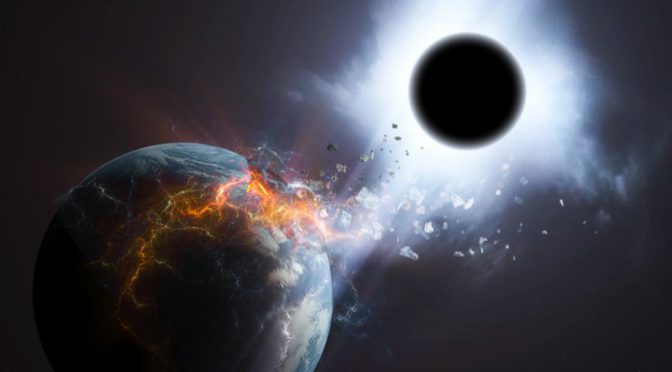Every year, as this time comes around, I sit back and think a lot about what exactly scares people. So many things that we deal with in our everyday lives can be so unassuming to most but absolutely terrifying to a few. But as I once pointed out, I’m not particularly afraid of things that require a lot of abstract thinking. Stick me in a situation where my entire biology is telling me to get out and I will be fairly afraid, but if I have to imagine something hurting me, I generally also imagine being able to fight back. Masked men with a machete? I wonder why no one’s grabbed the farm tools they just ran by. Animatronics in a pizza shop? I’m familiar with how fragile animatronics actually are. And, as much as people are caught up in some sort of clown hysteria right now, there’s really only ever been one clown outside of fiction that anyone had any real reason to be worried about.

Well, maybe two if you count the threat of obesity.
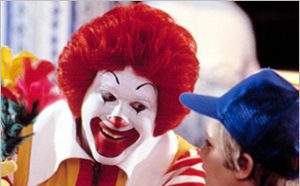
This doesn’t just hold for the small personal horrors either. As I pointed out once about the apocalypse, a lot of the allure for these scenarios is the feeling that we could somehow plan or prepare to handle them. Every apocalyptic story involves the survivor who finds their way out of it and deals with the horrors in front of them despite the odds. Aliens have invaded? You’ll join the resistance. Zombie hordes marching across the landscape attacking everyone they come across? There are entire websites devoted to planning your survival strategy. And nuclear winter? I know it sounds absolutely terrifying but we’ve actually survived something like that once before. So, despite how horrible they may seem to a lot of people, they’re never something I really sit back and worry about. As I once told my friend, the things that actually have kept me up at night are the things you could never prepare for.
Because where can you hide from something that makes the planet uninhabitable…?
Death From Above
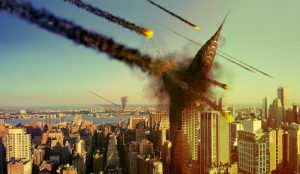 As terrifying as some of our fiction may be, we generally fall into a bit of a rutt when talking about the end times. So many of our narratives are the result of the same set of causes that we generally find ourselves telling the same set of stories over and over. Almost every Zombie Apocalypse will feature a rough collection of the same archetypes wandering through it. Generally there’s a good ol’ boy, someone too nice to survive in this world, the cut throat survivalist, and someone who completely lost their mind in the process. These are so ingrained into the genre that it feels strange when they’re not there. Meanwhile the YA Dystopian genre, which I’ve discussed in the past, generally follows the same basic theme of human arrogance destroying civilization. As a result, we see the human governments in the wake wildly flip the other direction.
As terrifying as some of our fiction may be, we generally fall into a bit of a rutt when talking about the end times. So many of our narratives are the result of the same set of causes that we generally find ourselves telling the same set of stories over and over. Almost every Zombie Apocalypse will feature a rough collection of the same archetypes wandering through it. Generally there’s a good ol’ boy, someone too nice to survive in this world, the cut throat survivalist, and someone who completely lost their mind in the process. These are so ingrained into the genre that it feels strange when they’re not there. Meanwhile the YA Dystopian genre, which I’ve discussed in the past, generally follows the same basic theme of human arrogance destroying civilization. As a result, we see the human governments in the wake wildly flip the other direction.
But the thing that kept me up at night as a child was a far more disconcerting concept. What happens if something comes that isn’t man-made or controllable? What do we do if the entire planet is hit with something that we just can’t fight back against. Not something that we did to ourselves and can try to think our way back out of. Not some strange virus that we have to quarantine, but something which simply changes the world without our participation and can’t possibly be resolved?

Some of them I’ve long ago stopped worrying about on a personal level. These things have made me more resolute in my support of the space program not for my own survival but the survival of the human race as a whole. As I mentioned when talking about the hype around Proxima b, any rocky surface we can land someone on outside of our own is another step towards ensuring our descendants can’t be wiped out in an instant. But on a personal level? Should a gamma ray burst strike the Earth head on, you wouldn’t have time to get into a bunker before you vaporize or get a lethal dose of radiation. Even sitting on the far side of the planet would be a gradual, agonizing death. The only way to really survive is to just not be on the planet at all when it actually happens. So, once again, let’s remember to keep funding NASA.
But not every major doomsday scenario from space is an instant death. There are some situations that could still have a great deal of story potential behind them. These are scenarios which we would have difficulty getting around without getting off this rock. One example would be if something large enough happened to sweep past our solar system, like a rogue planet, a neutron star, or one of these bad boys.
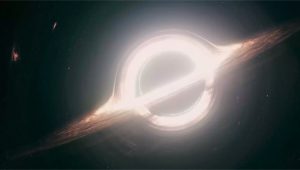
Ah yes, a black hole, the cosmic event you’re probably most afraid of when you think about it. Most people imagine that they would come by, suck everything into them, and crush us – but the truth is a bit more sinister. No, if a black hole were to come by we wouldn’t even notice them. In fact, by the time they caused their damage, it would be long gone. Because, you see, the gravitational well of a black hole is only as large as the star that created it. The event horizon, that place where you would experience the crushing, would really only be about the size of a star itself. So if it happened to cross by, not creating any light, only producing a gravitational effect, we’d never even notice it… then it would kill us a few months or even years later after being long gone.
You see, the way a black hole, neutron star, or a particularly large rogue planet is most likely to kill us is by disrupting orbits. The most conventional way to do that is to disrupt the orbit of smaller bodies like comets, asteroids, and dwarf planets in the far reaches of the solar system. But, should it come in close enough, we could see it do far worse to the solar system as it streaked on through. Because it wouldn’t just disrupt the orbit of smaller bodies if it came in close enough, it would disrupt our orbit too.
There are a couple ways this can go. One way it could go is these bodies could send us hurtling into the sun. This wouldn’t happen all at once, mind you, we’d be nudged and sent falling towards it slowly but surely, the surface of our planet slowly boiling before all life is scorched off the planet like burning off a wart. By the time our blue marble reached the inferno ahead of us, it would look distinctly more like Mordor on a particularly sunny day. If anyone was still alive on the planet by the end, they would have watched everything they loved turn into lifeless husks or engulfed in fire. And, if the idea of being hurled into the sun is too extreme for you, an out of control greenhouse effect is known to be able to do the same.
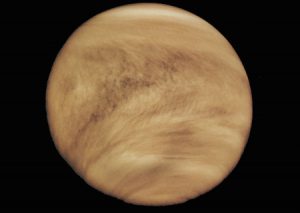
Alternatively, the object can fling the Earth the opposite direction, hurtling us deep into space. The world would enter a long, cold winter as we continue further and further away from the sun – far beyond the Goldilocks zone we’ve been in since the start. The waters would freeze, the plant life would slowly die out, and eventually all times would look like night as our sun became little more than the brightest star in the sky. if you were afraid of a nuclear winter, which could eventually end, the winter of being rendered a rogue planet would be far worse. There would be no day when the clouds part and the sun shines through, there wouldn’t really even be clouds anymore without the sun to power our weather. Instead, the sky would be a beautiful, crystal clear sky with an unobstructed view of the stars. And together we’d marvel at this view before freezing to death like Jack at the end of The Shining.
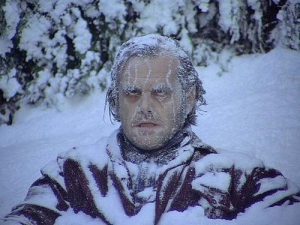
But then, what if the rogue planetoid wasn’t big enough to fling us far into space? What if it was something considerably smaller and closer than that? We’ve often run through the scenario of an asteroid hitting the Earth, and there’s not a lot we can do right now to stop that. But there’s another version of the impact which would be a slower, more tormented process. A direct hit on the Earth by anything big enough to count as an apocalypse would end life in an instant. But a direct hit isn’t the only way a big enough object could ruin all life here – it could just hit our neighbor.
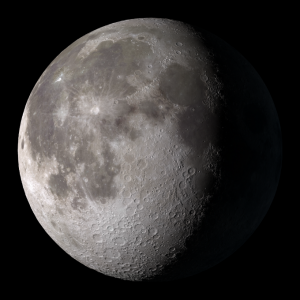
The moon’s surface tells a part of the story about how important it is to us. Acting like a bodyguard, the moon has taken countless hits in the past for the Earth. But what if it were hit by something it couldn’t take? It would have to be tremendous, enough to cause the whole thing to break apart, because anything less than absolute destruction would result in the moon coming back together in a lumpier form before eventually returning to form in a few million years. But a complete destruction? That would be a whole other story.
Hit hard enough, the moon could be rendered into a field of dust and debris that would continue to orbit the Earth. This ring would be like the ones around the gas giants, particularly Saturn, but be much dimmer and rockier in structure. And, at first, this would be a terrifying but beautiful sight, with the ring visible from the surface of the Earth at certain angles, streaking through the sky around the equator.
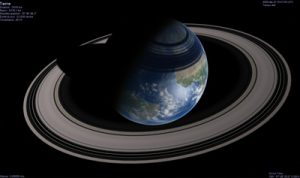
But the minute the moon is gone, our world’s going to go wild on us. The first sign would be the sudden loss of the tides and most waves. The oceans would become eerily serene, glass-like in some places, as only the gravity of the sun and wind would be pushing it anymore. And, while you wouldn’t know just from looking, those tides are important to the world’s ecosystem. The constant churning and sloshing of the ocean waters circulates heat from one part of the ocean to another, moves minerals from the ocean floor, and provides nutrients to certain ocean life. With the tides gone, so would be this constant mixing. Before long, as the ecosystem in the ocean collapses, we’d see the oceans become a lifeless mass of water. And this would be the first sign of what was about to happen to the land.
Weather patterns would start to change early on. The ocean’s circulation stopping would result in many weather systems ceasing to function the same way. But, more than that, the moon’s gravity did a hell of a lot more than move the waters, it also moved the planet. Our planet’s natural wobble, the thing that produces the seasons, was stabilized by that big singular rock in the sky. Without it, the entire Earth would start to sway wildly around and the seasons as we know it would cease to exist. The ecosystems on land would start to suffer almost as quickly as the ones in the water, and anything dependent on regular cycles in weather would soon either burn out or freeze over. Plant life would probably be the most heavily hit in this time, starting the slow death of ecosystems across the planet just like those in the sea.
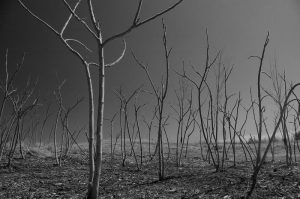
In fact, without the Moon here to help keep the Earth in check, even our orbit would be thrown out of wack. Like the scenarios of a giant object floating by, we’d be hurled in and out from the Sun. However, unlike those scenarios, we’d probably do both at once. Our orbit would go from slightly elliptical to severely. As it whips around on a wild course, we’d experience summers unlike anything ever experienced before followed by winters that would normally require a supervolcano to set off. We’d go from seasons of wildfires to record breaking blizzards with little middle ground in between. And the whole time, despite how miserable that would be, the very structures we could build to try to survive it would be facing a whole different threat – that ring in the sky.
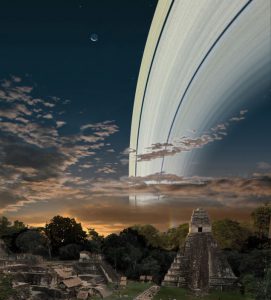
A bunker, a tower, some sort of construction which would allow us to control our environment would be the first instinct anyone had. Like in Snowpiercer, we could theoretically continue to survive so long as we kept producing energy and kept moving. But the entire time our structures would face new threats from above. That ring, beautiful as it would be, wouldn’t simply hang above. It would be constantly falling towards the Earth a little at a time. Some of these events would be breathtaking but harmless as meteor showers would cover the night sky. But others? The bigger chunks would be raining down on us for thousands of years. Any shelter we could build to survive the seasonal changes would be sitting ducks as massive rocks fall from what used to be our companion in the sky. Major strikes would happen almost daily, none large enough to end life, but easily big enough to destroy our efforts to make due with our new status quo.
You see, while other kids were kept awake at night by thoughts of evil dolls or men in hockey masks, that was what kept me up at night. You can fight back against aliens, zombies, or nuclear irradiated mutants. You can buy a gun, build a bunker, or farm in green houses. But late at night, left to my own thoughts, my tiny brain could only focus on the idea of what would happen if something truly massive came too close. Because in that scenario, even under the best of circumstances…
We’d just be forced to make due.
(I write novels. So far none of them involve something like this happening, but I have to admit, the thought has often crossed my mind. In the meantime, I’ll just waste my time left on this Earth rambling on twitter.)


